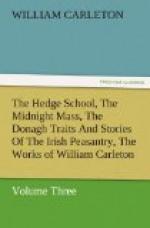Had this trying scene lasted much longer, Owen must soon have been a stiffened corpse. The child-like strength, however, which just enabled him to bear up without sinking in despair to die, now supported him when there was less demand for energy. The dog, too, by rubbing itself against him, and licking his face, enabled him, by a last effort, to recollect himself, so as to have a glimmering perception of his situation. His confidence returned, and with a greater degree of strength. He shook, as well as he could, the snow from his ’clothes, where it had accumulated heavily, and felt himself able to proceed, slowly, it is true, towards his father’s house, which he had nearly reached when he met his friends, who were once: more hurrying out to the mountains in quest of him, having been compelled to return in consequence of the storm, when they had I first set out. The whiskey, their companionship, and their assistance soon revived him. One or two were despatched home before them, to apprise the afflicted family of his safety; and the intelligence was hailed with melancholy joy by the Reillaghans. A faint light played for a moment over the gloom Which had settled among them, but it was brief; for on ascertaining the safety of their second son, their grief rushed back with renewed violence, and nothing could be heard but the voice of sorrow and affliction.
Darby More, who had assumed the control of the family, did everything in his power to console them; his efforts, however, were viewed with a feeling little short of indignation.
“Darby,” said the afflicted mother, “you have, undher God, in some sense, my fair son’s death to account for. You had a dhrame, but you wouldn’t tell it to us. If you had, my boy might be livin’ this day, for it would be asy for him to be an his guard.”
“Musha, poor woman,” replied Darby, “sure you don’t know, you afflicted crathur, what you’re spakin’ about. Tell my dhrame! Why, thin, it’s myself towld it to him from beginning to ind, and that whin we wor goin’ to mass this day itself. I desired him, on the paril of his life, not to go out a tracin’ or toards the mountains, good or bad.”
“You said you had a prayer that ’ud keep it back,” observed the mother, “an’ why didn’t you say it?”
“I did say it,” replied Darby, “an’ that afore a bit crassed my throath this mornin’; but, you see, he broke his promise of not goin’ to the mountains, an’ that was what made the dhrame come thrue.”
“Well, well, Darby, I beg your pardon, an’ God’s pardon, for judgin’ you in the wrong. Oh, wurrah sthrue! my brave son, is it there you’re lyin’ wid us, avourneen machree!” and she again renewed her grief.
“Oh, thin, I’m sure I forgive you,” said Darby: “but keep your grief in for a start, till I say the De Prowhinjis over him, for the pace an’ repose of his sowl. Kneel down all of yez.”
He repeated this prayer in language which it would require one of Edward Irving’s adepts in the Unknown Tongues to interpret. When he had recited about half of it, Owen, and those who had gone to seek him, entered the house, and after the example of the others, reverently knelt down until he finished it.




